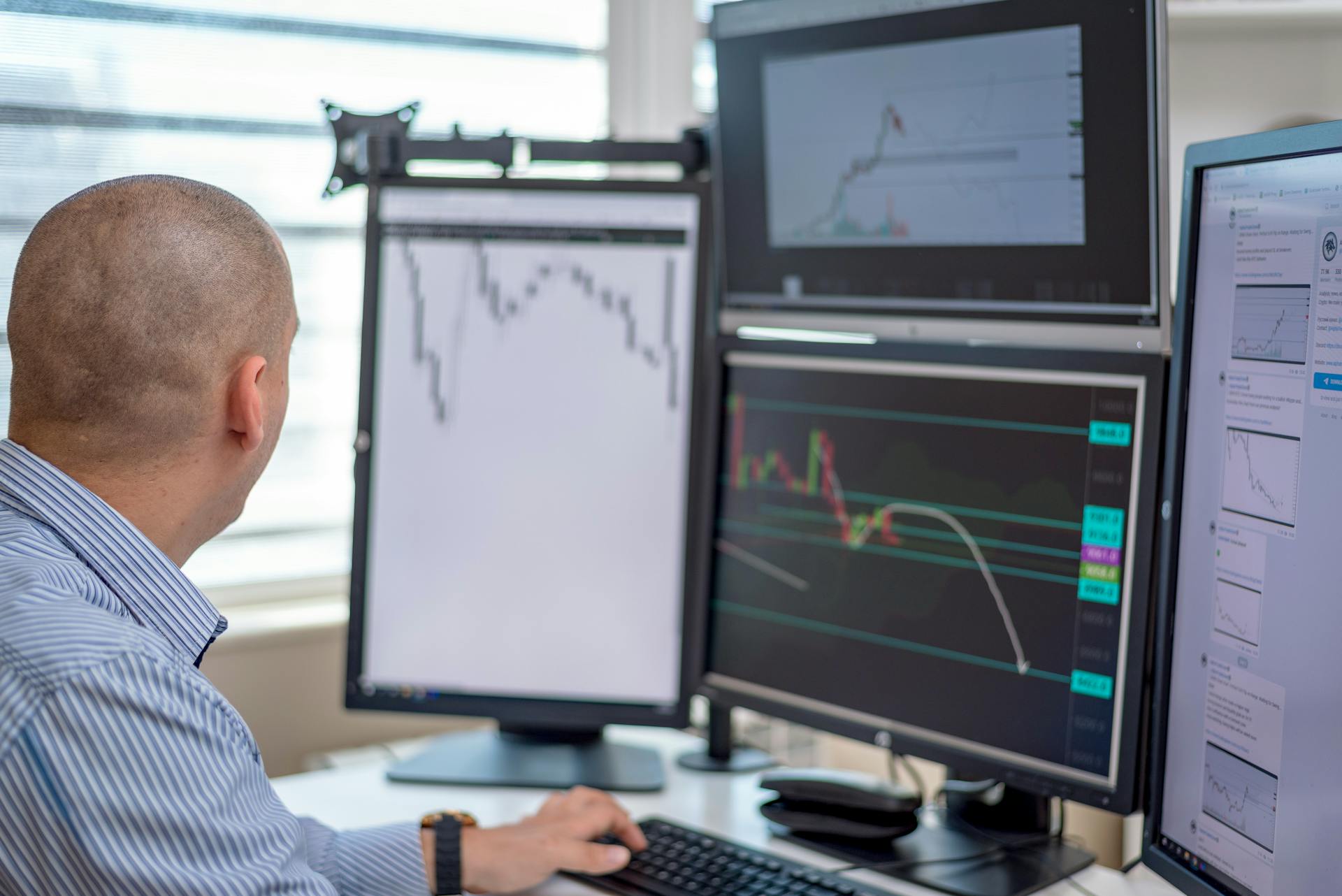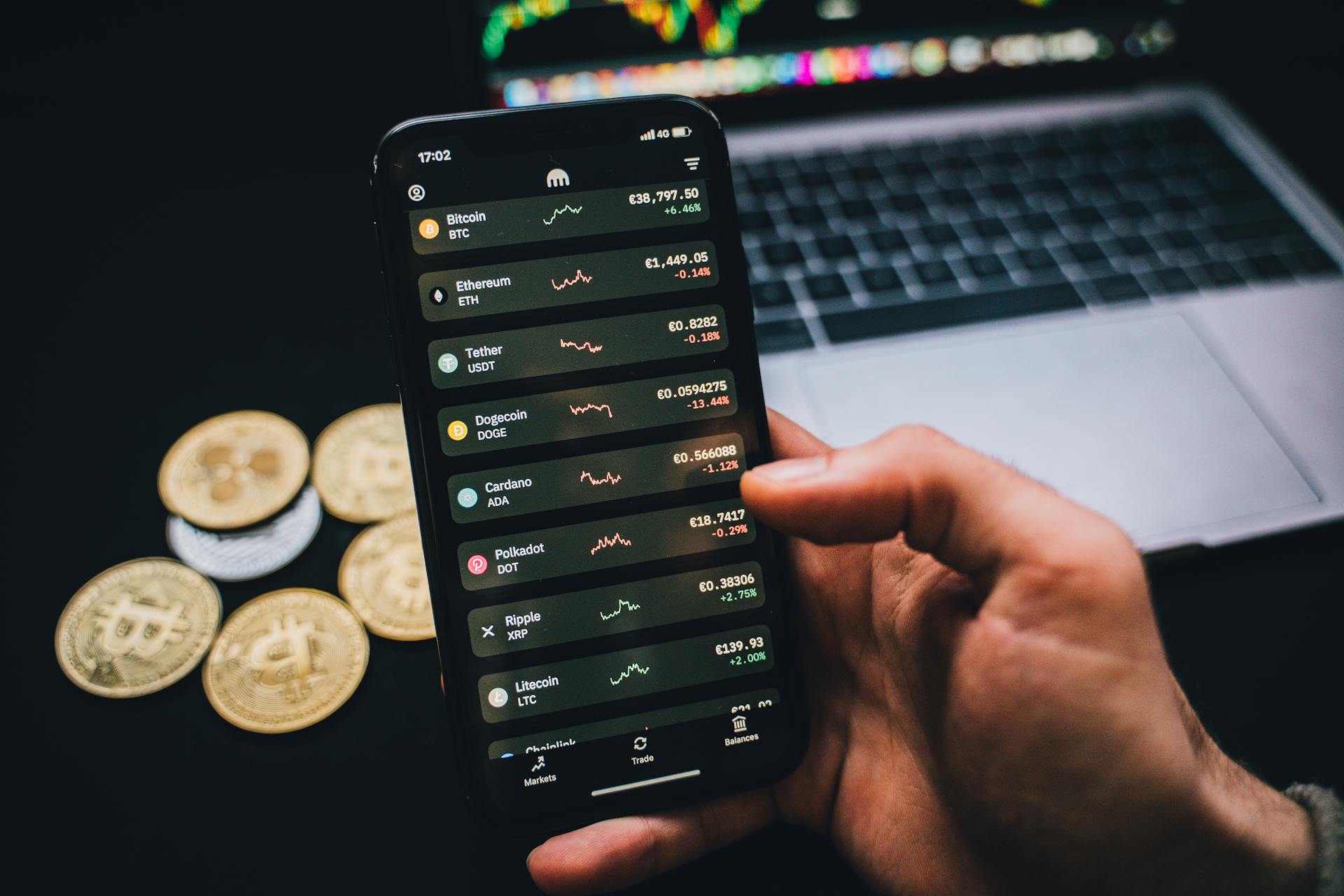
Becoming a commodity trader requires a solid understanding of the markets and a well-thought-out strategy. To start, you'll need to research the different types of commodities, such as energy, metals, and agricultural products.
You can begin by looking at the major exchanges, like the Chicago Mercantile Exchange (CME) and the Intercontinental Exchange (ICE), which offer a range of commodity futures contracts. The CME, for example, offers futures contracts on oil, natural gas, and agricultural products.
Developing a trading plan is crucial to success as a commodity trader. This involves setting clear goals, such as risk management and profit targets, and staying disciplined in your approach. By doing so, you can minimize losses and maximize gains.
To get started, you'll need to open a trading account with a reputable brokerage firm. This will give you access to the necessary tools and resources to execute trades and manage your positions.
For more insights, see: Minimum to Trade Futures Ibkr
Getting Started
The process to start a Commodity Trading Advisor (CTA) firm is reasonably straightforward and can be accomplished in a matter of weeks with the assistance of experienced counsel.

You'll need to refine your trading strategies and systems to ensure you're prepared to launch your CTA firm. This involves developing a clear and compelling investment strategy that showcases your trader's edge.
To start a CTA firm, you'll need to form an entity such as an LLC or corporate entity in your home state. This will serve as the foundation for your CTA firm.
Here's a brief overview of the steps involved in starting a CTA firm:
- Refine trading strategies and systems
- Form the entity that will serve as the CTA firm
- Take necessary examinations and file a registration application with the CFTC
- File a membership application with the National Futures Association (NFA)
- Develop a customer account agreement and risk disclosure document
- Open bank and brokerage accounts for the CTA firm
- Develop a coherent marketing strategy
- Solicit prospective clients and execute customer agreements
- Implement the investment strategy across live client accounts
Additionally, registered CTAs will need to develop a robust compliance program to avoid costly and unwanted regulatory entanglement.
Invest Directly
Investing directly in commodities can be a straightforward way to get started.
You can physically buy a commodity, but you'll need to figure out delivery and storage logistics. This can be relatively simple for investing in gold, as you can easily find a coin dealer online who can sell you a bar or coin.
Buying physical commodities like cattle, crude oil, or agricultural products can be a lot harder, as it's difficult to figure out delivery and storage. Investing in most physical commodities typically takes too much effort for individual investors.
A fresh viewpoint: Commodity Broker
Let's Get Started

The process to start a Commodity Trading Advisor (CTA) firm is reasonably straightforward and can be accomplished in a matter of weeks with the right guidance.
First, you'll need to refine your trading strategies and systems. This is a crucial step in developing a successful CTA firm.
Forming the entity that will serve as the CTA firm, such as an LLC or corporate entity, is also a necessary step. You'll want to form this entity in your home state.
You'll also need to take necessary examinations and file a registration application with the Commodity Futures Trading Commission (CFTC). Don't worry, there may be exemptions available.
Additionally, you'll need to file a membership application with the National Futures Association (NFA) for both the CTA firm and its Principals.
It's also essential to develop a customer account agreement and risk disclosure document, which must be approved for use by the NFA in the case of registered CTAs.
See what others are reading: Principal at Vc Firm Salary
Here are the steps to start a CTA firm in a concise list:
- Refine trading strategies and systems
- Form the entity (LLC or corporate entity) in your home state
- Take necessary examinations and file a registration application with the CFTC
- File a membership application with the NFA
- Develop a customer account agreement and risk disclosure document
- Open bank and brokerage accounts for the CTA firm
- Develop a marketing strategy and create marketing materials
- Solicit prospective clients and execute customer agreements
- Implement the investment strategy across "live" client accounts
Once you've completed these steps, you'll be well on your way to launching a successful CTA firm.
About the Instructor
Joel Rubano is a seasoned commodity trader with 20 years of experience in energy trading. He's worked with six different firms, managing portfolios worth billions of dollars.
Mr. Rubano has a wealth of knowledge in hedging financial exposures and managing speculative trading books. He's particularly skilled in power, natural gas, oil, and coal trading.
As the founder of Instradev, LLC, Mr. Rubano offers trader development and risk management programs for energy and financial firms. He also lectures at leading universities, sharing his expertise with MBA and Masters classes.
His book, Trader Construction Kit, is a practical guide that helps readers develop the skills and techniques of professional traders. The book is currently in its second edition, making it a valuable resource for those looking to improve their trading skills.
Take a look at this: Hedge Fund Financial Analyst Salary
Investment Options
To become a commodity trader, you'll need to choose from a variety of investment options. There are over 35 commodities to choose from, including commodity-linked stocks and ETFs.
You can trade commodity derivatives, such as futures contracts, but be aware that futures contracts are designed for major companies involved in commodities rather than for individuals. Trading on margin, which is trading borrowed money, can amplify your losses.
Investing in commodity ETFs and mutual funds is another option, offering broad exposure to commodities without directly buying the commodity. For example, you can invest in the SPDR Gold Trust ETF or the iShares S&P Commodity-Indexed Trust.
Consider reading: Can You Buy Etfs after Hours
Options
Options can be a great way to invest in commodities, but it's essential to understand what they are and how they work. Options give you the right but not the obligation to exchange an asset at a specific price on a specific date.
There are over 35 commodities to choose from, including metals, energy, agricultural, livestock and meat, and soft commodities. You can trade the price of underlying commodity futures on US crude, gold, and silver. Options can be a bit complex, so it's crucial to learn more about them before getting started.
Additional reading: Spot Price vs Strike Price
You can trade commodity options in a few easy steps. First, select 'options' from the menu on the left. Then, tick 'commodities', choose your asset – for example, 'Spot Gold' – and whether you want a daily, weekly or monthly option. Next, pick the option type, strike price, and trade size you want. Finally, open your first position.
Here are some examples of commodity types you can trade options on:
Remember, options can be a great way to diversify your investment portfolio and potentially earn higher returns. However, it's essential to understand the risks involved and do your research before getting started.
Invest in Stocks
Investing in stocks can be a great way to diversify your portfolio and potentially earn higher returns.
Investing in commodity stocks can be another option.
A commodity-producing company's stock price won't necessarily rise or fall in line with the commodity it produces.
For example, an oil production company will benefit when crude oil prices rise and suffer when they fall.
What's more important is how much oil the company has in its reserves and whether it has lucrative supply contracts with high-demand purchasers.
Take a look at this: When Prayer Becomes Real?
Future Investments
You can invest in commodities through various methods, including trading futures contracts, which are largely designed for major companies involved in commodities rather than for individuals.
Futures contracts require you to maintain a certain amount of capital, known as margin, in your brokerage account. This can amplify your losses if the commodity prices are volatile.
To trade futures, you'll need a brokerage account that allows for it, and you'll be required to have enough resources on hand to cover any margin call.
Some commodity ETFs hold the physical assets they're invested in, such as gold bullion or coins, while others use more complicated investments to synthetically mimic the underlying market.
Investing in commodity ETFs and mutual funds can offer broad exposure to a range of commodities or commodity-linked stocks from a single position.
You can find an investment fund that invests in physical materials, commodity stocks, futures contracts, or a combination.
Related reading: Commercial Account Executive
For example, investors who want broad exposure to gold could invest in the SPDR Gold Trust ETF (GLD), while those who are bullish on oil prices could buy shares of the United States Oil Fund LP (USO).
Here are some popular commodity ETFs and mutual funds:
Trading commodity futures can be a way to speculate on the underlying price of commodities, but it's essential to have enough resources on hand to cover any margin call.
You can trade commodity futures with a CFD, which allows you to trade without owning the underlying asset.
Consider reading: Futures Thinkorswim
Frequently Asked Questions
How much do commodities traders make?
Commodity traders can earn an estimated average salary of $155,525 per year, with some professionals making up to $310,516 annually. Discover more about the lucrative world of commodity trading and the skills required to succeed in this field.
What qualifications do you need to be a commodity trader?
To become a commodity trader, you'll typically need advanced degrees in finance or economics, along with specialized certifications like the CFA or CCT. Additionally, online courses in market analysis, risk management, and trading platforms can also provide valuable skills and knowledge.
Sources
- https://www.fool.com/terms/c/commodity-trading/
- https://www.ig.com/en/commodities/what-are-commodities-how-do-you-trade-them
- https://www.etoro.com/trading/a-beginners-guide-to-commodity-trading/
- https://business.ucdenver.edu/masterclass-commodity-trading-hedging
- https://www.investmentlawgroup.com/perspectives/guide-to-starting-a-cta-commodity-trading-advisors/
Featured Images: pexels.com


